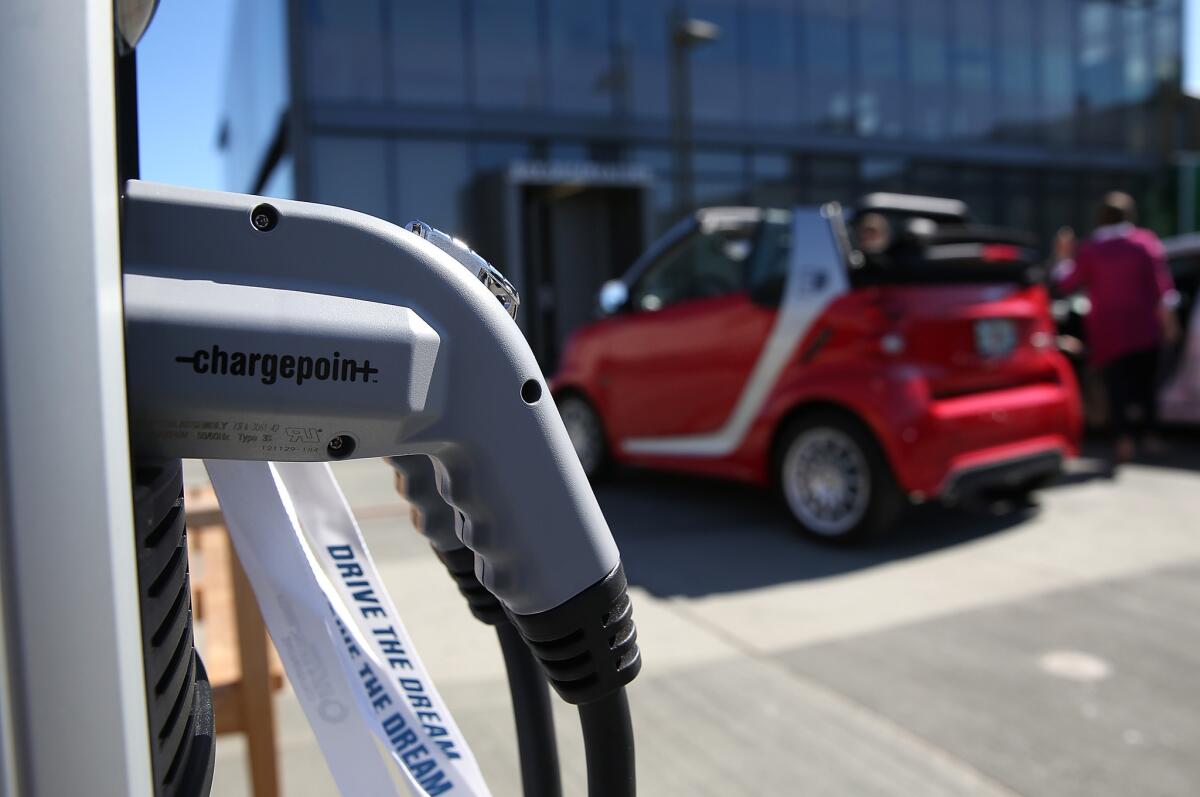PG&E, Volkswagen plugging into electric vehicle infrastructure

- Share via
Good news for electric vehicle owners: Two new entities have earmarked significant investments in EV charging networks.
California utility Pacific Gas & Electric Co. announced its intention to fund the construction of 25,000 electric vehicle chargers across its service area in Northern and Central California.
PG&E said Monday it would spend an unnamed amount to install the 240 volt Level 2 chargers at commercial and high-density residential sites, and that it would build an additional 100 of the 500 volt DC Fast Chargers as well.
And Volkswagen of America on Tuesday declared at the Electric Drive Congress in Washington that it has committed $10 million to U.S. electric vehicle infrastructure.
“Automakers have effectively delivered electric vehicles that can satisfy the needs of most American drivers,” VW’s vice president of product marketing and strategy, Jorg Sommer, said in making the announcement.
Sommer called on the federal government to commit more of its funding to EV infrastructure, and encourage state and federal organizations to “commit to cleaner fleets by purchasing EVs.”
Like, for example, its own popular e-Golf.
VW and PG&E are the latest of many outfits to declare their willingness to participate in the EV market.
Last month BMW of North America, Volkswagen of America and ChargePoint Inc. announced their intention to construct up to 100 charging stations in “express charging corridors” from San Diego to Portland, Ore., on the West Coast and Boston to Washington on the East Coast.
Construction has already started on the Western corridor, where a string of new charging stations will allow vehicles to travel the length of California and into Oregon. As many as 100 stations will be up and running by the end of 2015, said Pasquale Romano, ChargePoint’s chief executive.
The PG&E announcement won’t be good news for everyone, however. Officials said the cost of the EV charging network -- which they estimate will begin to be operational in 2017 and take five full years to complete -- will be underwritten by current PG&E customers -- including those who do not own or drive electric vehicles.
Customers will start seeing an additional charge of 70 cents a month on their statements, starting in 2018, PG&E’s director of electric vehicles James Ellis said.
PG&E has already applied to the California Public Utilities Commission for the right to proceed with the plan. Construction of the new network will begin following a hoped-for “speedy approval” of the plan, Ellis said.
The two German automakers and PG&E are playing a game of catch-up. The electric car company Tesla has already built a substantial national network of charging stations for its popular Model S sedans.
And ChargePoint, BMW and VW’s partner on the new proposed network, already operates more than 20,000 charging stations in North America, the vast majority of them in the U.S.
PG&E’s Ellis said his organization’s intention is to help alleviate “range anxiety,” which he called the most significant barrier to EV adoption.
According to the latest numbers released by the trade group Electric Drive Transportation Assn., 570,475 electric vehicles -- a combination of hybrid, plug-in and battery electric vehicles -- were sold in America in 2014. That represents about 3.5% of the total 16.4 million motor vehicles sold in the U.S. last year.
Unlike Tesla’s chargers, though, PG&E’s won’t dispense electricity for free. The proposed charging stations, which will be built and owned by PG&E but operated by a third party, will bill consumers for the electricity they use.
While PG&E waits for government approval, it already has raised the ire of ChargePoint. The company denounced the electric utility’s plan as a “monopoly.”
“The proposal PG&E filed today creates a monopoly in EV charging equipment and services that will stifle growth and innovation in the market,” Romano said in a statement. “PG&E’s proposal will hamper the industry, is bad for ratepayers, bad for EV drivers and bad for California’s emissions reduction goals.”
Twitter: @misterfleming







